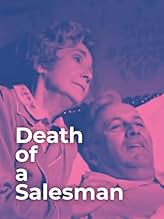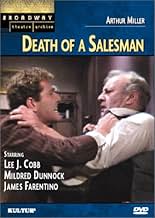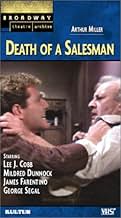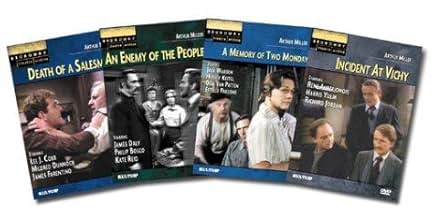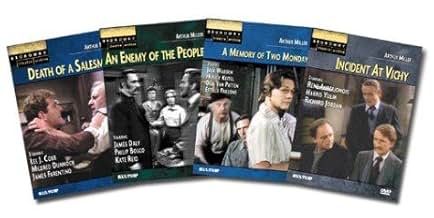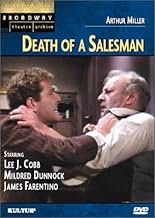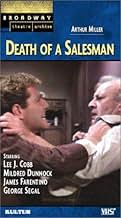An abridged award-winning television adaptation of a famous play about an aging travelling salesman who's on the verge of a nervous breakdown. His job is gone, and his family hates him for n... Read allAn abridged award-winning television adaptation of a famous play about an aging travelling salesman who's on the verge of a nervous breakdown. His job is gone, and his family hates him for never being there. He tries mending things with them.An abridged award-winning television adaptation of a famous play about an aging travelling salesman who's on the verge of a nervous breakdown. His job is gone, and his family hates him for never being there. He tries mending things with them.
- Won 3 Primetime Emmys
- 5 wins & 8 nominations total
Marc Fiorini
- Stanley
- (uncredited)
- Director
- Writer
- All cast & crew
- Production, box office & more at IMDbPro
Featured reviews
This is my favorite adaption of the play, "Death of a Salesman". The play itself is timeless and could be portrayed in a modern setting (with some updating). Willie Loman and his family will always exist as long as people in all walks or professions are perceived as being past their prime and a liability rather than an asset to society. It is a tragic episode in the life of a family that outgrow dreams and ambitions and must accept reality and human imperfection.
I have had arguments over the fact that I believed Gene Wilder played Bernard in this play before he became prominent in a movie career. This cast is unique with such excellent actors as Mildred Dunnock, Lee J. Cobb, George Segal, James Farrentino, Bernie Koppell and the remaining members of the cast.
I have had arguments over the fact that I believed Gene Wilder played Bernard in this play before he became prominent in a movie career. This cast is unique with such excellent actors as Mildred Dunnock, Lee J. Cobb, George Segal, James Farrentino, Bernie Koppell and the remaining members of the cast.
Willy Loman never realises until the end that he is a loser. Although his son Biff knows he himself is a loser, his father won't accept this. Son, Hap, like his father doesn't know he is a loser, either. Miller seems obliquely to imply that society is to blame for Willy's sad life. Maybe so, surely society doesn't cut him much slack, especially as represented by the son of his long time firm, for which he has been a fairly successful salesman much of his life. Whatever one's opinion on this subject, the play certainly portrays very genuine emotions and problems as the aging Willy more and more loses contact with reality and harkens back to nodal points in his life, especially contacts with his successful brother Ben. Or is Ben just a figment of his imagination. We can only guess. At the final funeral scene, Hap's losing philosophy continues. Could he and Biff take Willy's $20,000 insurance award and make it as ranching partners out west? We'll never know; Hap is determined to "make it big" in the Big Apple. Fat chance!
A better cast would be hard to imagine and the stage setting is beautifully photographed. The "fantasy" scenes are smoothly integrated with bits of "movie magic" that emulate what would be accomplished in the theatre with tricks of lighting. Cuts from the complete play are minor. This was TV at its best.
A better cast would be hard to imagine and the stage setting is beautifully photographed. The "fantasy" scenes are smoothly integrated with bits of "movie magic" that emulate what would be accomplished in the theatre with tricks of lighting. Cuts from the complete play are minor. This was TV at its best.
The only slight reservation I have about this TV version of the play is the fact that it was clearly shortened for the medium. The greatest thing about this recording is that it preserves Lee J. Cobb's interpretation of the lead role. I was enrolled in a drama school in the early 60s, a time when several of our teachers had actually seen him in the 1947 stage play. They would frequently speak, in reverent tones, of the scorching great performance that Cobb delivered. This 1966 television revival makes Cobb seem all the more remarkable to me due to the nearly twenty year interval that had passed since the New York run of the play. No matter how great a performance he might have initially delivered, many an actor would have lost a lot of the original intensity in that span. On top of this, Cobb had experienced a battering ordeal at the hands of the House on Un-American Activities Committee toward the end of the run of the play. There is a fascinating story behind Cobb's development of the role. During rehearsals, the director was considering replacing Lee, as his work was not showing promise. The story goes that, at a critical point, Cobb had been staring at a crack in a wall in the rehearsal space. Suddenly he was seized by a strong sense of the character which immediately endowed his reading with uncanny feeling and intensity. Late in the run, it is told that the characterization took such a pervasive hold on the actor that he started to take it home with him, unable to snap out of it.
This was my first meeting with the play. After finishing it, I felt satisfied, but also far from finished with the play itself. I immediately wanted to see other versions of this, both to compare with this, and to enjoy the great writing. As this is an abridged (by the author himself) version, I'm obviously curious as to what more there is to it. I never felt anything missing.
Lee J. Cobb was made for a role like this. The vulnerable, temperamental and old fashioned man that's grasping for happiness. I can imagine how intimate it must have been to see him act this on stage, and I'm happy that at least we have this TV version of his performance.
The touches done to make this a TV movie instead of a filmed play, did not really add much to the movie. The locations still felt like sets and the performances were good, but theatrical. The transitions, dialogue happening over each other, etc, that is only possible in an edited medium like this, did not add much to the story.
Lee J. Cobb was made for a role like this. The vulnerable, temperamental and old fashioned man that's grasping for happiness. I can imagine how intimate it must have been to see him act this on stage, and I'm happy that at least we have this TV version of his performance.
The touches done to make this a TV movie instead of a filmed play, did not really add much to the movie. The locations still felt like sets and the performances were good, but theatrical. The transitions, dialogue happening over each other, etc, that is only possible in an edited medium like this, did not add much to the story.
When "All My Sons" became too hard to take and critics began to call it a mere timepiece, Arthur Miller wrote another. Instead of life from the well-to-do point of view, he would wander to the other side of the street and look back. "Death of a Salesman" is life from the working man's front porch. And what a telling it is!
Finally, Lee J. Cobb and Mildred Dunnock have one more opportunity together, this time recorded for the ages. And the rest of the cast, superb.
Dear television gods, please bring it back at least one more time. This is a piece that needs to be seen by each generation: a constant reminder of how great the temptation always is to live in greed at the expense of the common man. Thank you again, Mr. Miller, for your wisdom and haunting words.
Finally, Lee J. Cobb and Mildred Dunnock have one more opportunity together, this time recorded for the ages. And the rest of the cast, superb.
Dear television gods, please bring it back at least one more time. This is a piece that needs to be seen by each generation: a constant reminder of how great the temptation always is to live in greed at the expense of the common man. Thank you again, Mr. Miller, for your wisdom and haunting words.
Did you know
- TriviaIn his autobiography "Timebends", Arthur Miller said that Lee J. Cobb was his favorite Willy Loman.
- ConnectionsFeatured in Role Model: Gene Wilder (2008)
Details
- Release date
- Country of origin
- Official site
- Language
- Also known as
- La muerte de un viajante
- Filming locations
- Production company
- See more company credits at IMDbPro
Contribute to this page
Suggest an edit or add missing content

